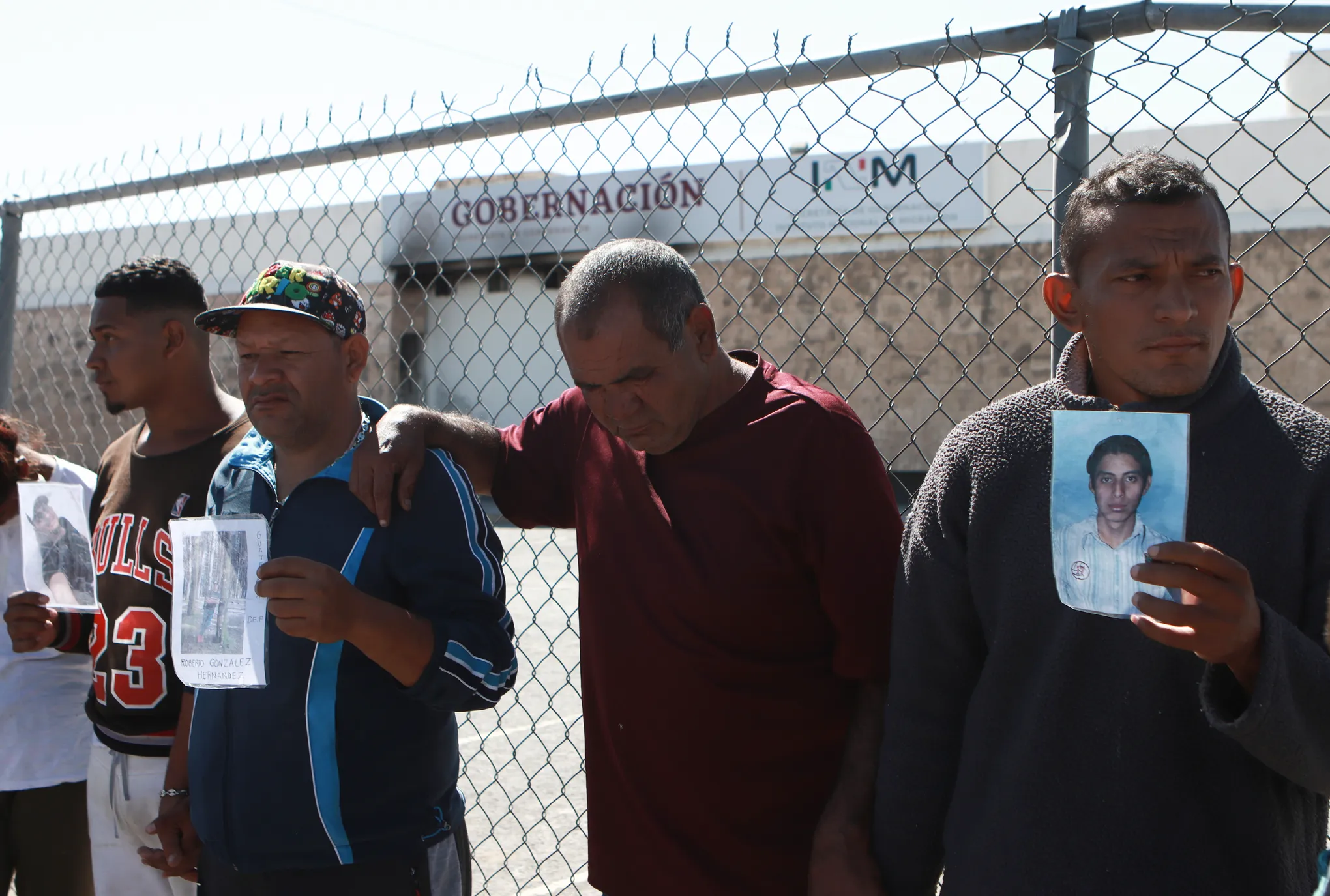Hundreds of people who do not have the resources to carry on their journey to the United States or to return to the South are stuck in the Central American country. They are left to rely on charity and precarious jobs to continue financing their dream.
Jessica sits in the doorway of a closed store on the busy Sixth Avenue, near Guatemala City’s Central Park. She is seeking shade on this hot January day. At her side rest her children, Carolina, 17, Daniel, seven, and Laura, five, while they watch people coming and going at midday. Jessica is 36 years old and is already the grandmother of Valery, a six-month-old girl that Carolina is carrying half asleep in a quilt, more to protect her from the sun than to keep her warm. Jessica’s husband, Jorge, walks from one traffic light to the next, torn between the desire to ask for a little financial help from people crossing the street and the need to protect himself from the sun.
Since the end of December, Jessica’s family has spent their days on Sixth Avenue with signs that read, “Spare me a coin that comes from your heart. God bless you,” and the Venezuelan flag drawn on it. They take turns walking down the street showing the sign, not adding many more words. Some people give them something, but most just look at them and avoid them.
“We left Machiques, in Venezuela, in 2017. I worked in a shoe store and my husband was a bricklayer, but with both salaries, we couldn’t even cover 50% of the monthly expenses,” Jessica says with a sad grimace. “Then we went to Cúcuta, in Colombia, and then to Bogotá. We were there for six years, but it is no longer possible to get a decent salary. Since October 28, we have been traveling to the United States and we stopped here in Guatemala because we no longer have money to move forward. That’s why we are asking people to help us,” she adds.
The corners of Sixth Avenue have become tiny temporary homes for Venezuelans. A few yards from Jessica, Leidy, 39, is sitting on a piece of cardboard with her son and her husband, Enrique. Six months ago, they left Peru, where they lived for a year. “Inhale and exhale” are written on her shirt, but Leidy knows she can never relax. “I want to return to Barquisimeto, in Venezuela. The American dream no longer exists for me,” she says. “Leaving Honduras, the Guatemalan police stole the $1,100 we had to continue the trip. Now we have been on the streets for two months,” she recalls.
A short distance away is Fabiola. She was also a shoemaker in Venezuela. Was. The migrants all talk about what they used to be and their occupations in the past. The life on which they built their future no longer exists. “I want to stay here in Guatemala, if possible, because they have told me that in Mexico people can kidnap us, and we have already suffered enough,” she confides.
Stuck without money.
Fabiola, Jessica, and Leidy share the same fate. Venezuelan women stranded with their entire family, in Guatemala without enough money to continue the trip to the United States or to turn around and return south to Venezuela or other Latin American countries.
They sell pacifiers, food, and drinks, but most beg for quetzals (the Guatemalan currency) on the corners. “We get around 100 quetzals (about $12) per day and it is not enough for food, lodging, and the trip. And a room in a hotel costs 100 quetzals,” explains Jessica. “We are short of about $1,500 to get to the United States and so far, we have spent $2,700. So we almost always sleep in Central Park, but we are afraid of being attacked.”
More than 7.7 million Venezuelans have fled their country in recent years due to economic and political instability. The majority have taken refuge in Colombia, Peru, Ecuador, or Chile. However, the pandemic and economic crisis that have hit these countries have driven a new Venezuelan exodus to the United States. They all face the cruel Darién jungle, between Colombia and Panama, which almost half a million migrants crossed between January and November of last year, 65% of whom were Venezuelans.
Jessica thinks that the hardest part is over anyway, having survived the Darién Gap. “We walked three days and three nights in the mud, climbing slippery slopes. We counted 14 bodies along the route, almost all of them children who had drowned in the rivers,” the woman recalls. “Leaving there, we went to Honduras, where we spent a month begging on the street. I hope to raise enough money to get out of here and then on to Chicago,” she sighs.
With her enthusiasm, Jessica seems to forget that Guatemala, as well as Mexico, acts as a wall for migrants traveling to the United States without a visa. From January 1 to October 31, 2023, Guatemala rejected 20,932 people, 71% of whom were Venezuelans, 7% Haitians and 7% Ecuadorians. Every day, the Guatemalan national police detain and expel dozens of (mostly Venezuelan) migrants after their brief stay at the Care Center for Foreign Migrants (CAMIEX).
Ending the journey
While Jessica and her family look for a corner of Central Park in which to spend the night, at the other end of Guatemala City’s historic center, July knocks on the door of Guatemala City’s Casa del Migrante, a local migrant shelter. She is wearing a backpack and carrying a bag in each hand. Behind her are 12 people with plastic bags and all their belongings. The average age of the group is no more than 25, and the youngest of them is a baby of just four months. They have raised enough money to continue their journey to Mexico and plan to leave Guatemala behind with the first light of dawn.
“I am the group’s guide. We left Venezuela months ago and have lived and worked on the streets. The only thing that gives me hope is that as soon as we are in Mexico, we can apply for a visa for the United States, and hopefully in a few weeks, this trip will be over,” the woman confides.
Since January 2023, migrants in Mexico are required to download the free CBP One application on their mobile phone to schedule an appointment at one of the ports of entry on the southern border of the United States and request relief. If, on the one hand, the application aims to speed up the planning of appointments, those who do not have access to mobile devices, or the internet are excluded from requesting international protection. The logic of using the application to apply for protection has provoked numerous reactions in the world of activism, to the point that Amnesty International declared that “the mandatory use of the CBP One mobile application as the sole means of entering the United States to seek international protection is a clear violation of international law.”
Like July, hundreds of Venezuelans arrive in Guatemala City in small groups and often by night. Some ask for shelter for a night at the Casa del Migrante, run by the Scalabrini missionaries. They are looking for a bed where they can lie down and forget the day. They often arrive dehydrated and with foot wounds and infections, which need nursing care. When dawn comes, they fade away like a dream and continue their journey, taking the children who can walk by their side, and the younger ones, wrapped in a jacket tied to their backs.
“Last year 32,000 people passed through here and more than 90% were Venezuelans,” explains Gabriela Girón, an educator at the Casa del Migrante. “10% of the migratory flow are children who arrive with high hopes, but also great sadness. Despite their age, they are aware of the reality and are very afraid that drug traffickers could kidnap or kill them in Mexico,” she adds.
A few minutes before going to his room, July’s nephew Miguel asks for a photo with his brothers. Two days later, the boy sends a message: “We are in Tapachula in Mexico. We don’t have any more money. Only God knows when we will reach the United States.” (https://english.elpais.com/international/2024-01-28/trapped-in-guatemala-venezuelan-migrants-in-limbo.html)





































